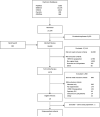Anxiety symptoms in survivors of critical illness: a systematic review and meta-analysis
- PMID: 27796253
- PMCID: PMC5289740
- DOI: 10.1016/j.genhosppsych.2016.08.005
Anxiety symptoms in survivors of critical illness: a systematic review and meta-analysis
Abstract
Objectives: To evaluate the epidemiology of and postintensive care unit (ICU) interventions for anxiety symptoms after critical illness.
Methods: We searched five databases (1970-2015) to identify studies assessing anxiety symptoms in adult ICU survivors. Data from studies using the most common assessment instrument were meta-analyzed.
Results: We identified 27 studies (2880 patients) among 27,334 citations. The Hospital Anxiety and Depression Scale-Anxiety (HADS-A) subscale was the most common instrument (81% of studies). We pooled data at 2-3, 6 and 12-14month time-points, with anxiety symptom prevalences [HADS-A≥8, 95% confidence interval (CI)] of 32%(27-38%), 40%(33-46%) and 34%(25-42%), respectively. In a subset of studies with repeated assessments in the exact same patients, there was no significant change in anxiety score or prevalence over time. Age, gender, severity of illness, diagnosis and length of stay were not associated with anxiety symptoms. Psychiatric symptoms during admission and memories of in-ICU delusional experiences were potential risk factors. Physical rehabilitation and ICU diaries had potential benefit.
Conclusions: One third of ICU survivors experience anxiety symptoms that are persistent during their first year of recovery. Psychiatric symptoms during admission and memories of in-ICU delusional experiences were associated with post-ICU anxiety. Physical rehabilitation and ICU diaries merit further investigation as possible interventions.
Keywords: Anxiety; Critical care; Critical illness; Meta-analysis; Review.
Copyright © 2016 Elsevier Inc. All rights reserved.
Figures
References
-
- Herridge MS, Tansey CM, Matté A, Tomlinson G, Diaz-Granados N, Cooper A, et al. Functional Disability 5 Years after Acute Respiratory Distress Syndrome. N Engl J Med. 2011 Apr 7;364(14):1293–304. - PubMed
-
- Parker AM, Sricharoenchai T, Raparla S, Schneck KW, Bienvenu OJ, Needham DM. Posttraumatic Stress Disorder in Critical Illness Survivors: A Metaanalysis*. Crit Care Med. 2015 May;43(5):1121–9. - PubMed
Publication types
MeSH terms
Grants and funding
LinkOut - more resources
Full Text Sources
Other Literature Sources
Medical


